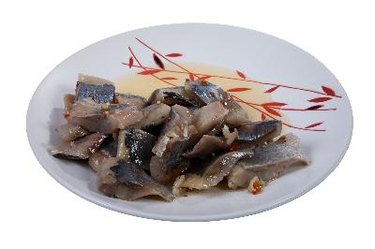
Pickled herring is traditional in Scandinavian cuisine, and you may also find it in Japanese cooking. You can make this dish at home by combining salted herring with a pickling marinade made with sugar, vinegar and spices. An acquired taste, this fish offers several important nutrients, including high quantities of vitamin D and selenium.
Calories and Fat
Video of the Day
A 3.5 oz. serving of pickled herring has 262 calories. If you are a woman, your dietary needs generally run from 300 to 500 calories per meal, and men require roughly 400 to 600 calories in each meal. As such, a serving of pickled herring alone will not satisfy your calorie requirements. Add healthy components to make a complete meal, such as steamed snow peas and barley. This is a fatty fish, with 18 g of fat per serving. Despite this, the fat should not harm your health -- only 2 g of it is saturated fat, the type that can clog your arteries and lead to heart disease.
Video of the Day
Carbohydrates and Protein
Pickled herring contains small amounts of carbohydrates: 9.6 g per serving. You need far more carbs in your meal plan -- 225 to 325 g -- but eating a balanced meal will help you boost your intake. This type of fish provides high-quality protein that helps you develop muscle and benefits your immune function. Each serving contains 14.1 g of protein, or approximately 25 to 30 percent of the amount you should consume daily.
Vitamin D
Eat a serving of pickled herring, and you take in nearly twice the amount of vitamin D your body requires daily. The vitamin D in this fish provides critical benefits for your bones and teeth. An article published in the March 2011 issue of "Archives of Gerontology and Geriatrics" indicates that vitamin D levels may impact your risk of developing cancer, heart disease and infections. Consult your physician before taking vitamin D for these conditions.
Selenium
Pickled herring serves as an excellent source of selenium, a mineral necessary for making antioxidants. Each serving of selenium provides 84 percent of the daily recommended intake. The mineral quantity in this fish makes it a smart choice for boosting fertility in men. Evidence in the January 2011 edition of the "International Journal of General Medicine" correlates selenium supplementation -- along with vitamin E, a vitamin contained in pickled herring in small amounts -- with improved sperm motility. Study participants, infertile men, received 200 mcg of selenium over 100 days.
Other Vitamins and Minerals
Include pickled herring in your diet to increase your intake of vitamin B-12. With 71 percent of the daily recommended intake, this fish is good for nerve health. You also take in 17 percent of the vitamin A and 16 percent of the niacin you require each day. Additionally, each serving of fish provides 10 percent or less of the phosphorus, calcium, iron, vitamin E, thiamin, riboflavin, vitamin B-6, pantothenic acid, magnesium, potassium, zinc, copper and manganese.
Considerations
If you have hypertension or a heart condition, you should only eat pickled herring occasionally. With 870 mg of sodium per serving, this quantity accounts for around 58 percent of the daily limit suggested by the American Heart Association. Even if you are healthy, this is quite a bit of sodium -- the American Heart Association recommends that most Americans have 1,500 mg or less a day.
- Food Network; Pickled Herring Recipe; Tyler Florence
- USDA National Nutrient Database: Fish, Herring, Atlantic, Pickled
- The Diet Channel; Calories: What's an Ideal Daily Intake?; Michele Turcotte
- McKinley Health Center; Macronutrients: The Importance of Carbohydrate, Protein, and Fat; March 2008
- "Archives of Gerontology and Geriatrics"; Vitamin D...; N. Gueli, et al.; March 2011
- MedlinePlus; Selenium in Diet; March 2009
- University of Maryland Medical Center; Vitamin B12 (Cobalamin); June 2009